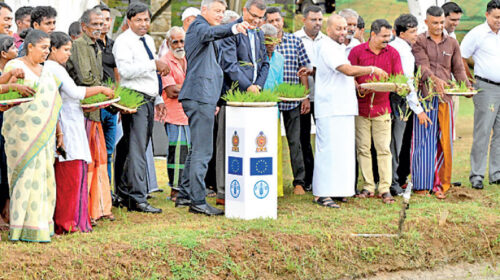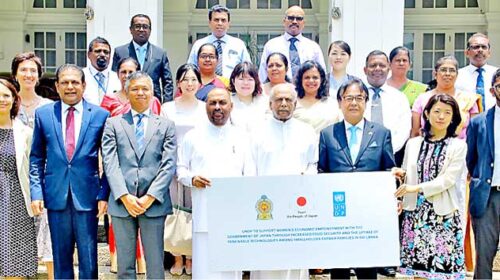EU and FAO launch 4 m Euro initiative to improve efficiency, sustainability of paddy farming
- Program targets 71,000 smallholder paddy farmers and 1,200 paddy seed farmers across 7 districts
 The Food and Agriculture Organisation of the United Nations (FAO) together with the European Union (EU) on Saturday launched a new program to strengthen food security in Sri Lanka by boosting the productivity and sustainability of the paddy cultivation sector.
The Food and Agriculture Organisation of the United Nations (FAO) together with the European Union (EU) on Saturday launched a new program to strengthen food security in Sri Lanka by boosting the productivity and sustainability of the paddy cultivation sector.
The 4 million Euro (approximately Rs. 1.5 billion) initiative funded by the EU was initiated at an event held at the Bataatha Agro Technology Park in Hambanthota.
Implemented by FAO with the support of the Ministry of Agriculture and the Mahaweli Authority, the program targets 71,000 smallholder paddy farmers and 1,200 paddy seed farmers across seven districts including Polonnaruwa, Badulla, Ampara, Matale, Puttalam, Kurunegala and Hambantota districts who were severely impacted by the recent economic crisis.
Speaking at the event, which saw the official start of the farmer field schools EU Ambassador to Sri Lanka Denis Chaibi said: “With this new action, we want to help farmers not only to grow more, but most importantly to grow better so that they can increase their production and incomes, but also protect the environment around them. We hope that together with FAO and the Government of Sri Lanka we can gradually promote a transition towards greener and climate-smart agriculture. Transition that produces sufficient amount of food, while protecting the planet and its people.”
The recipient farmers will receive material and technical support to transition from traditional cultivation methods into climate-smart, modern farming techniques. The eligible paddy farmers cultivating up to 0.5 ha of land will receive 50 kg urea fertiliser and necessary tools to enhance efficiency of fertiliser use. 3,820 tonnes of urea fertiliser procured by the program were already handed over to the Ministry of Agriculture to be distributed among selected smallholder paddy farmers and paddy seed farmers.
Paddy seed farmers supported through the program will also receive locally produced, high quality paddy seeds alongside material support such as parachute trays to improve efficiency and profitability of cultivation methods. Furthermore, all recipients will be enrolled in farmer-field schools to improve knowledge sharing on modern techniques such as the Integrated Plant Nutrient Management (IPNM) strategy to boost efficiency and reduce dependency on the use of chemical fertiliser.
Agriculture Minister Mahinda Amaraweera expressed his appreciation to the FAO and the EU for the implementation of a holistic program aimed at improving the sustainability of Sri Lanka’s paddy sector. “Our paddy farmers underwent significant challenges over the past few years. This support we received from FAO and the EU is a testament to their perseverance during the tough times, for which we are thankful. These inputs and knowledge sharing will no doubt elevate the quality of rice production and the livelihoods of Sri Lankan paddy farmers.”
FAO Representative in Sri Lanka Vimlendra Sharan said: “This program marks an important milestone in FAO’s work in Sri Lanka over the past year – the shift back into development from the emergency response. We are grateful for the support we have received from the EU to implement this program, which aims to address some of the longstanding concerns in the local paddy sector, to reach better production, leading to better nutrition, a better environment and improve food security for all Sri Lankans.”
EU and FAO said they will continue to work closely with the Government of Sri Lanka and key partners to support the recovery of the agriculture sector while building resilience and sustainability into the sector to increase yield and profit for smallholder farmers as the sector recovers.
Japan, UNDP launch fresh programs to boost socio-economic recovery
- $ 3.8 m initiative via home-based agriculture and energy security interventions
- 58,000 women and youth will directly benefit from these projects, while indirectly impacting over 132,000 vulnerable community members from the North-Central, North-Western and Eastern provinces
 The Government of Japan and the United Nations Development Program (UNDP) yesterday launched a new initiative to strengthen socio-economic recovery via home-based agriculture and energy security measures.
The Government of Japan and the United Nations Development Program (UNDP) yesterday launched a new initiative to strengthen socio-economic recovery via home-based agriculture and energy security measures.
The $ 3.8 million (Rs. 1.17 billion) initiative supports improvement of women’s economic wellbeing for smallholder farmer families in Sri Lanka. It was launched in the presence of Prime Minister Dinesh Gunawardena, Japanese Ambassador Mizukoshi Hideaki, UNDP Resident Representative Azusa Kubota, JICA Chief Representative Tetsuya Yamada, Agriculture Minister Mahinda Amaraweera, Power and Energy Minister Kanchana Wijesekera, senior government officials and development partners.
The ongoing socio-economic crisis has had serious impacts on the agricultural sector in Sri Lanka. The rising energy costs and evolving climate change impacts have further exacerbated due to the situation. The initiative launched yesterday aims at addressing these issues.
It will support vulnerable smallholder farming families in the dry zone districts, namely North-Central, North-Western and Eastern provinces, with a focus on women’s economic empowerment and adoption of green agricultural technologies.
Funded by the Japanese Supplementary Budget (JSB) and working together with the Government of Sri Lanka and relevant stakeholders, the intervention aims to achieve its objectives through two projects; the first focusing on diversifying livelihoods and introducing entrepreneurship programs, targeting women-led MSMEs. The second aims to strengthen energy and food security, through the revival of the rural agricultural economy by providing access to innovative markets, value and supply chain improvements along with the adoption of modern, green agricultural technologies which will increase productivity and efficiency.
A total of 58,000 women and youth will directly benefit from these projects, while indirectly impacting over 132,000 vulnerable community members from the North-Central, North-Western and Eastern provinces of Sri Lanka.
Prime Minister Gunawardena said: “Government of Sri Lanka appreciates the continuous support extended by the Government of Japan and the United Nations Development Program towards the country’s efforts to recover from the socioeconomic crisis. We believe this is a significant step towards creating a food and energy secure Sri Lanka, both vital sectors to the fabric of the country’s economy.”
Highlighting Japan’s commitment to the people of Sri Lanka in crisis recovery efforts, Ambassador Mizukoshi said: “Japan has been working together with the Government of Sri Lanka and relevant UN agencies for economic and social empowerment of women in Sri Lanka, including the formulation of National Action Plan for Women, Peace and Security. These new projects will provide practical means to uplift the lives of vulnerable communities. Especially, we recognise the special needs of women-headed households in conflict-affected areas. It is a great opportunity to create positive synergy with UNDP’s expertise and JICA’s technical assistance for supporting livelihood and vulnerable communities.”
UNDP Resident Representative Kubota said: “These are times when multiple-solutions through multiple-partnerships are required because we are faced with compounding and complex challenges. I am grateful for the commitments demonstrated by a wide range of actors present today. We must join hands to address the needs of the most vulnerable and affected segments of the society – particularly women-headed households. And investing in them will have visible, long-term benefits for the families and communities.”